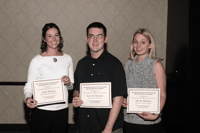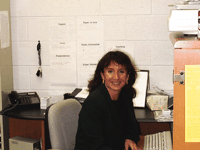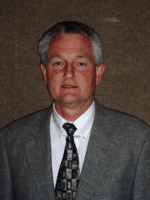Preserving and Promoting Our Discipline: Pharmacology Students Speak Out
- Myron L. Toews, PhD1,
- Stephanie W. Watts, PhD2 and
- Barbara S. Beckman, PhD3
- 1Myron L. Toews, PhD, serves on the ASPET Graduate Recruitment and Education Committee. He is Professor of Pharmacology at the University of Nebraska Medical Center in Omaha, NE. E-mail mtoews{at}unmc.edu; fax 402-559-7197.
- 2Stephanie W. Watts, PhD, is incoming Chair of the Graduate Recruitment and Education Committee for ASPET, a member of the ASPET Centennial Celebration Committee, and serves as Graduate Director and Associate Professor in the Department of Pharmacology and Toxicology at Michigan State University, East Lansing, MI. Stephanie agrees with the graduate students that Pharmacology Rocks! E-mail wattss{at}msu.edu, fax 517-353-8915.
- 3Barbara S. Beckman, PhD, is Chair of the Graduate Recruitment and Education Committee, and is Professor of Pharmacology at Tulane University Health Sciences Center, New Orleans, LA. E-mail bbeckman{at}tulane.edu.
In three years, the American Society for Pharmacology and Experimental Therapeutics (ASPET) will celebrate its centennial. Over the course of the past century, pharmacology has transformed biomedicine in countless ways, and the discipline itself has met with vast advances in technology and knowledge. At times, the explosion of biomedical knowledge has called for increasingly specialized areas of expertise, redefining what it means—and what it will mean in the future—to be a “pharmacologist.”
The contingency that is perhaps most sensitive to the changing climate of pharmacology comprises those individuals who are just beginning their forays into the discipline—especially students. To recognize and learn from the views of students, therefore, the ASPET Committee on Graduate Recruitment and Education, in addition to providing information about pharmacology training and careers to students, has encouraged graduate students to share their wisdom and unique perspectives on pharmacology as a discipline with each other and with pharmacology faculty. The Graduate Student Colloquium held at Experimental Biology 2004, in Washington DC, provided one opportunity to hear such student opinion1. Issues addressed by students include their perceptions of the unique strengths of our discipline, how to successfully reach prospective pharmacology graduate students with this information, how to recruit and retain them within our discipline, and additional ways in which pharmacology graduate students can more actively and effectively participate in the future of the discipline.
Finding Pharmacology
Barbara Beckman (Tulane) and Gary Rankin (Marshall) served as facilitators for a group discussing questions related to “Finding Pharmacology.” This theme subsumed a number of cogent questions addressed to students: Where, when, and how did you first learn about pharmacology? Why did you choose it? And how could you have discovered it sooner?
As predicted, most of the graduate students in this group found pharmacology “by accident.” There is so little information available to the general public (and to students in particular) about pharmacology that it is often confused with pharmacy and “working in a drug store.” Students voiced a strong sense of needing to get the word out, not only to college undergraduates but to high school students as well. Web sites with links to pharmacology programs, as well as posters describing pharmacology’s particular niche, need to be distributed to high schools and undergraduate colleges and universities. ASPET’s new edition of the brochure Explore Pharmacology, available as hard copy or online (www.aspet.org), was applauded as an important resource for spreading information about pharmacology (1).
Undergraduate Pharmacology Courses
A second group of graduate students, facilitated by Michal Laniado-Schwartzman (NY Medical Center, Valhalla) and Eddie Morgan (Emory), considered questions about under-graduate pharmacology courses: How useful are these courses? How should they be structured? What purposes should they serve? How can they serve the needs of both pre-med and pre-grad students? Who is our target audience and what are our motivations and goals?
Those twelve to fifteen universities that have undergraduate pharmacology courses, such as Tulane, Duke, University of Vermont, University of Utah, and University of California-Riverside, are very successful at introducing pharmacology concepts and principles to sophomores, juniors, and seniors. Unfortunately, these courses are the exception rather than the rule. Some of the undergraduate pharmacology courses are survey courses geared to pre-med students, while others are geared to students who are considering many different fields of study. One student remarked that he had learned about concepts such as agonists and receptors in a physiology course, not realizing at the time that these concepts are at the core of pharmacology. For several years, Pharmacology faculty at the University of Nebraska Medical Center taught an undergraduate course called “Understanding Common Drugs” to undergraduate students at the University of Nebraska-Omaha. The course met for two hours one day per week, with a faculty member teaching the first hour and a graduate student teaching the second hour. This format was viewed as highly successful, providing formal teaching experience for graduate students, as well as introducing pharmacology to undergraduates. Unfortunately, the course was not approved for advanced credit for science majors and was therefore taken primarily by non-majors to meet a general science requirement. Thus, the best audience for the course was probably not effectively targeted, and the course has not been taught for the last several years.
It was strongly recommended that we in the discipline take pharmacology to undergraduate science faculty by making personal contacts and providing them with materials that could easily be incorporated into their existing courses. Certainly, providing research experiences to undergraduates in pharmacology is a winning approach; ASPET continues to fund summer research experiences through individual and institutional Summer Undergraduate Research Fellowship (SURF) programs. Opportunities for undergraduates to write honors theses in the laboratories of pharmacology faculty members are another approach. Bringing scientists to under-graduate campuses to talk about their jobs and experiences, not only in academia but in the pharmaceutical industry and other areas, was suggested as a proactive approach to introducing students to the diversity of potential career opportunities in pharmacology. It was also acknowledged that many of us were positively influenced to pursue science while in high school, and thus it might be beneficial to introduce pharmacology as a discipline and career option even before students enter college.
Unique Strengths of Pharmacology
Margaret Scofield (Creighton) and Joey Barnett (Vanderbilt) facilitated discussion of the following questions: What are the unique strengths of pharmacology as a discipline? How is pharmacology different from other basic sciences in its methods, systems, approaches, and ways of thinking? What are its unique “selling points”?
One major strength that was highlighted is the integrative nature of pharmacology. Although there is considerable over-lap among all biomedical disciplines in this day and age, pharmacology is somewhat unique in its almost absolute requirement for integration of knowledge, from the molecular and cellular levels into the tissue and organ levels, in order to appreciate the principles of physiology and pathology and to develop safe and effective therapeutics. The subject matter and experimental techniques of microbiology, immunology, and genetics are also important in the field. Pharmacology thus stands at the crossroads between basic science and medicine, essentially at the tip of the learning pyramid leading medical students into the clinic. Students who want to understand the basis of medicine, but prefer not to practice medicine, are uniquely served through the study of pharmacology, which has proved a strong selling point in pharmacology recruiting. The broad and integrated knowledge base provided by the study of pharmacology is often touted by industry leaders as a major reason why they prefer to hire pharmacology program graduates.
Another integrative aspect of pharmacology is that we, perhaps more than others, enjoy a team approach to studying the way drugs interact with biological systems. In addition, pharmacology as a field enjoys a wider variety of job opportunities than disciplines such as microbiology, biochemistry, and physiology. Pharmacologists are often sought after in law firms, on Wall Street, and in government, as well as in industry and academia. Myron Toews (Nebraska), who received his PhD in biochemistry, reminisced that when he became interested in studying receptors, all the well-known scientists working on receptors appeared to be pharmacologists. Despite his early apprehension about entering this “specialized discipline,” he visited a pharmacology department and noticed multiple bulletin boards filled with job opportunities, in contrast to the one small bulletin board advertising jobs in his biochemistry department. Another unique strength of pharmacology is the emphasis on quantitative concepts of drug action (and of biology in general), such as potency and efficacy. The quantitative nature of the science behind drug–receptor interactions and dose–response relationships is at the heart of clinical therapeutics and a vital part of what makes pharmacology such an important discipline.
Students and Advisors: Join in at the Graduate Student Colloquium at EB 2005 in San Diego on April 1!
Another great opportunity for interactions among students, advisors, and career professionals who care about the future of pharmacology.
This year’s theme will be Drug development at the edge: What every pharmacologist should know about intellectual property, licensing, startups, and venture capital.
Promoting Pharmacology
Stephanie Watts (Michigan State) and Larry Lash (Wayne State) led a discussion centering around the following questions: How do we introduce students to the unique strengths and “selling points” of pharmacology? What works best for recruiting graduate students into the biomedical sciences in general, and how should we be exploiting Web sites, brochures, seminars, and recruiting visits? More specifically, what methods should be devised to highlight our less well-known discipline? How do we recruit minorities into pharmacology programs?
It was agreed that pharmacology graduate students can probably tell the story best. The integrative nature of our discipline is generally attractive and must be stressed, and the misconception that pharmacology is somehow only relevant to pharmacists, as opposed to its true place at the heart of medicine, continues to be challenging. Web site development is important to the cause, and students confirmed that online information was one of their major routes for exploring potential graduate programs. Faculty links to their publications and a good description of their research are helpful. Simple user-friendly sites seem best; animations and pop-ups are viewed as unimportant and even as distracting, in accordance with a recent study of recruiting Web sites (2). Posters with Web site addresses on tear-off cards work well.
One excellent suggestion was to send graduate students back to visit their undergraduate institutions to give talks. Former undergraduate classmates of these students would relate best to their peers and their personal experiences, and the communication of student success stories at undergraduate institutions is an important element in setting up effective pipelines between undergraduate and graduate programs. The new ASPET Explore Pharmacology brochure is outstanding; we should saturate students at the high school and undergraduate levels with this brochure. Joey Barnett (Vanderbilt) described a two-step process involving personal contacts at small liberal arts colleges that his program has found successful. Letters are written to undergraduate professors describing the graduate program and the discipline of pharmacology. This step is followed with a personal visit to the undergraduate campus, usually by faculty, although graduate students might be very effective in this role as well. Personal contacts are made, and students with good academic backgrounds are encouraged to try pharmacology research. Faculty at pharmacy schools indicated that pharmacy students with good academic backgrounds can often be encouraged to pursue a research experience, which works to recruit these students to pursue doctorates in pharmacology.
Pharmacology’s Industry Connections
Myron Toews and Eileen McCarron (PhRMA) facilitated a discussion of questions related to careers in industry: How can pharmacology students make industry connections, explore industry opportunities, and otherwise prepare themselves for careers in industry? What is the pharmaceutical industry looking for from new graduates? What do students interested in industry careers look for in their training?
Internships appear to be a great way to establish industry links, and many options are available. The University of Nebraska Medical Center (UNMC) partners with Novartis for industry internships (generally three or four months) in Basel, Switzerland, for their graduate students at some time during their training. This unique opportunity for students, not only to experience industry career options, but also to spend some time in another country and culture, has proven very popular. It helps in recruiting students into the pharmacology graduate program from UNMC’s combined first-year biomedical graduate program, and those students who have worked at Novartis have found it invaluable, with at least one student who participated in this internship program eventually choosing a career in industry. Students whose family or personal situations preclude a trip to Switzerland have had relatively easy success in identifying other industry internships closer to home. It was suggested that ASPET explore developing a list of industry internship possibilities and contact information, and that PhRMA could possibly help in setting up internships as well. Although these internships are generally for students, faculty could also benefit from such industry experiences, making contacts and obtaining first-hand insight into industry careers that they could pass on to students.
Programs organized to explore career options are important. ASPET plays an important role for establishing networks that relay online information about various fellowships. Career fairs can also be successful, taking advantage of faculty contacts with colleagues in government, industry, and small colleges. One student mentioned that the graduate students themselves had organized such a career fair at his institution, tying in with the idea of students as “full agonists” (see below). The numerous opportunities for students to learn about careers at the Experimental Biology meeting were also highlighted, including other colloquia as well as personal contacts. Those interested in industry were encouraged to engage industry scientists at their posters to ask them about opportunities and their specific experiences. Edward French has written that “the younger generation seems more attuned to marketplace needs than we either recognize or admit to” (3).
Pharmacology Graduate Students As “Full Agonists”
Emel Songu-Mize (Louisiana State-New Orleans) and Colin Campbell (Minnesota) led a discussion of questions about graduate student involvement and activism: How can pharmacology graduate students get involved in promoting their discipline? How can they be proactive in their own departments and their overall education? How can they reach out to others in terms of recruiting, teaching undergraduates, or public service? What are the opportunities for involvement at the state and national levels?

Although some graduate students would be willing to participate in bringing pharmacology to science classes in high school and colleges, such activities would require time away from their research, which, in today’s highly competitive research and funding environment, could raise the objections of their superiors. Nevertheless, a community service requirement in graduate programs, much like the community service that medical students perform, would instill values early in pharmacology students’ careers and could ultimately preserve and promote our discipline; graduate student associations might be useful in this regard, both at the campus and national levels. Pharmacology faculty members encouraged the graduate student discussants to be forthcoming with their individual mentors and graduate program supervisors, because knowing and providing what graduate students want and need is critical for preserving the enterprise.
One clear way in which students could become more involved in their discipline is through student membership in ASPET and active participation in the student chapter of ASPET. Promoting a more active role for students will be a goal of the Committee over the next few years. Student members of ASPET should become proactive in driving programming and activities that they believe to be important. After all, today’s students are the future leaders of our discipline and of ASPET.
Conclusions and Followup
Perhaps the most important outcomes of the Colloquium were not the specific ideas discussed, but rather the empowering of the students and their clearly demonstrated willingness to be involved in shaping the future of pharmacology. The faculty in attendance were impressed by the quantity and quality of student participation, and all agreed that the discipline of pharmacology was in capable hands for the future. One faculty member commented that “the students always surprise you with how insightful they are.” Students commented that the Colloquium gave them “a chance to give their perspective on what is working and what isn’t in pharmacology programs.” Several students recommended strongly that future colloquia be designed to incorporate active student participation, rather than relegating students to the role of a passive audience. Student enthusiasm for our discipline was perhaps best illustrated by the student whose evaluation sheet ended by saying, “Pharmacology rocks!!” It was clear to those faculty members who engaged the pharmacology graduate students in this Colloquium that a continuing dialog with our student leaders will go a long way toward preserving and promoting our discipline.
Footnotes
-
↵1 The Committee experimented with a “reverse” format for the Graduate Student Colloquium at Experimental Biology 2004. Instead of using this forum primarily for faculty to provide their perspectives on pharmacology, graduate students were probed for their views of the discipline and its future. The two-hour session began with introductions, an overview of goals, and instructions for six small groups to address different specific questions. Once students chose their topic, discussions proceeded for twenty minutes, with one student acting as scribe and faculty members serving as facilitators. All participants then reassembled and a spokesperson from each group presented key points, which was followed by a lively discussion open to everyone at the Colloquium. Overall, both the Colloquium topics and the new “reverse” format were perceived as highly successful, both by the organizers and the participants.
- © American Society for Pharmacology and Experimental Theraputics 2005

Barbara S. Beckman, PhD, is Chair of the Graduate Recruitment and Education Committee, and is Professor of Pharmacology at Tulane University Health Sciences Center, New Orleans, LA. E-mail bbeckman{at}tulane.edu.

Stephanie W. Watts, PhD, is incoming Chair of the Graduate Recruitment and Education Committee for ASPET, a member of the ASPET Centennial Celebration Committee, and serves as Graduate Director and Associate Professor in the Department of Pharmacology and Toxicology at Michigan State University, East Lansing, MI. Stephanie agrees with the graduate students that Pharmacology Rocks! E-mail wattss{at}msu.edu, fax 517-353-8915.

Myron L. Toews, PhD, serves on the ASPET Graduate Recruitment and Education Committee. He is Professor of Pharmacology at the University of Nebraska Medical Center in Omaha, NE. E-mail mtoews{at}unmc.edu; fax 402-559-7197.



